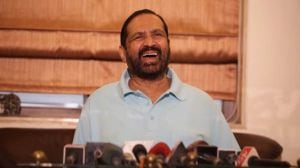The dead help the living make a killing at rly station
SURAT, July 21: This may not be the best of occupations, but Shankar Giridhar knows it pays to make a living out of the dead.As those nam...

SURAT, July 21: This may not be the best of occupations, but Shankar Giridhar knows it pays to make a living out of the dead.
As those nameless faces that strew the Surat railway station 8212; appearing dead even while they breathe 8212; begin their final journey, they are halted for one last rite: the display of their corpses.
Their bodies earn what they could not while alive, moving passers-by enough to drop a few coins as they hurry to catch a train or return to a loved one. Watching from a distance is Giridhar. Hours after the body has been taken to the crematorium, Giridhar returns to his wife and children with enough in his pocket to feed them.
It is a peculiar life for the 35-year-old, who arrives at the railway station early every morning looking for bodies, marking those precariously close to death. He has a vast pool to choose from: beggars and destitutes of every description, the ill and the insane, and the unfortunates who found themselves on the tracks either by accident or deliberation.
But Giridhar is happy only when no one comes forward to claim the dead body. For, the only raw material for his deadly business is unclaimed bodies.
The moment a body is spotted, the station authorities write a memo to the railway police. If Giridhar has not already made his appearance next to the dead, he is summoned from his hangout near the platform ticket window.
Giridhar then comes into his element. He buys a kafan and a white cloth to shroud the corpse and carries it on a stretcher to the entrance, which space he has been allotted by the railways. And then waits for the ambulance to come around. The longer it takes, the better for him.
While the sophisticates would find it macabre, Giridhar needs no convincing about his profession. 8220;No one wants to touch half-cut, burnt or badly injured bodies. I am a social worker8221;, he says. 8220;Still, the police sometimes accuse me of killing beggars to make a killing.8221;
To prove he is not cheating anyone, he uncovers the corpse before him, inviting those who want to to examine it.
Once the ambulance arrives, he escorts the body to the crematorium, only to return to railway station in search of someone who has just passed away.
On an average he gets to tend a body a day and is officially paid Rs 120 for it. Giridhar won8217;t reveal whether that amount exceeds his collection8217;. 8220;It8217;s a service I am doing. What if I earn something in the process?8221;, he asks.8221;
Giridhar employs three others who help him carry the body around and tend it in his absence. On lean days, 8220;I double up as reservation agent and grab seats to take care of my expenses8221;, he says.
A vendor selling groundnuts 10 feet away from Giridhar8217;s vantage point says wistfully, 8220;It8217;s a good business, requires no capital.8221;
With the police and the railway authorities passing the buck to each other and the lack of ambulances, Giridhar has a free run. Says station manager D R Solanki, 8220;It has become a nuisance, but we can8217;t help it. All we are supposed to do is to inform the railway police. It is their job to look after the body.8221;
8220;We can8217;t keep the bodies in the police station. The railways should provide a room for them, but they don8217;t even have enough stretchers8221;, says constable S Jadeja, who is attached to the police chowky near Platform No 1. Since an ambulance takes hours to reach the station, there is little option but to keep the body in Giridhar8217;s custody, he adds.
Dead men may tell no tales, but they save some from living death.
Top
- 01
- 02
- 03
- 04
- 05






























